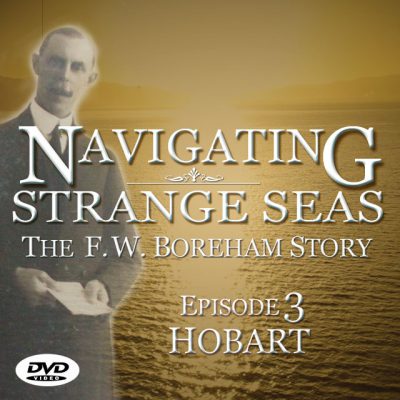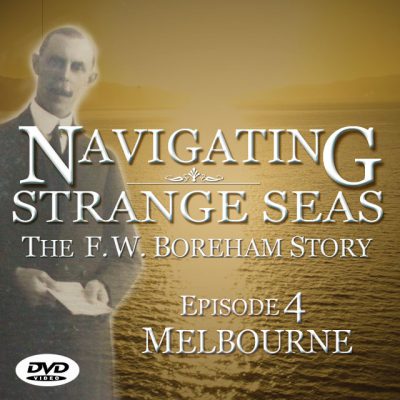
home > Books By F.W. Boreham > The Silver Shadow > GYP
III
GYP
Gyp was a fox-terrier. Although no dog-fancier would have looked a second time at him, his portrait, finely framed, hangs over the study mantelpiece. A photograph of his grave in the garden may be seen in the corner of the dining-room. John Broadbanks often tells his brother ministers that Gyp was the means of his conversion. Some of them know the story, having, in a moment of fraternal confidence, heard him tell it. It is worth recording.
The pretty old manse at Silverstream is a model in its way. As a badge of its nationality, two tall New Zealand palms stand, like giant sentries, right in front of the house. But, to show that tender thoughts of older lands hang pleasantly about the place, a pair of laburnums guard the gate and drape it towards Christmas-time with their graceful tassels of gold. Roses monopolize the front border, and are evidently tended by a hand that loves them.
A row of apple-trees holds possession of the garden along one side of the manse, whilst, away to the other, there stretches a trim and sunny lawn. The blackbirds can never make up their minds whether it is better fun singing in the apple-trees on the eastern side of the manse or hopping about the soft green lawn on the west. The manse itself is a dreamy old place, with cosy rooms, a long hall, an immense kitchen, and spacious sun-bathed verandahs. You hear nothing in the daytime but the songs of the birds in the tall blue-gums near by, and at night the stillness is only broken by the chirping of a cricket.
I do not know if John Broadbanks made any serious effort to conceal the pride with which he entered upon his occupation of the place. If so, the effort was a dismal failure. After a very creditable college career in the Old Country, John had become a fully ordained minister at last. As he strutted bare-headed up and down the lawn, or lounged in lordly abandon in a deck-chair on the verandah, it was easy to discern the pride with which he made himself the master of the manse.
And when, from the cavernous old hall, there emerged on to the sunny verandah a slighter, slenderer form, all clad in the becoming déshabillé of blue sunbonnet and print pinafore, it was just as easy to read in his eyes the satisfaction with which he had made Lilian its mistress.
John meant well, and certainly no ministry could have opened with fairer promise. Everything was in his favour. He had good health, a pleasing presence, a fine education, a hungry mind, a lofty ideal, a devoted congregation, and a wife who worshipped him. And yet, for all that, he came to grief. He sinned greatly and was greatly forgiven. The years that he allowed the cankerworm to eat were never exactly restored to him, but I am sure that the later years of his life were the more rich and fruitful because of his earlier transgression and repentance. But I anticipate : I must tell the whole story.
John, I have said, meant well; but he had one grave frailty. He was generous to a fault. He could not say ‘No.’ Therein lay the root of all the misery. If only John Broadbanks, in the course of his elocutionary exercises, had mastered the clear emphatic enunciation of that mighty monosyllable, it would have saved that opening ministry of his from sad disaster. But it was not in him to do it. In order to get to the secret of the trouble, you must know something of the place itself. Silverstream, as can be seen from the map, is in the province of Otago. Otago is essentially a Scottish settlement: was it not founded less than a century ago by elders of the Free Kirk? In such a community the induction of a new minister is an event of some moment. Now Silverstream, you must know, is merely one of scores of small townships and tiny hamlets scattered about the Taieri Plain. True, it is among the largest of those settlements, but it is only one of many for all that.
When John first settled at Silverstream, I was at Mosgiel— eight miles away — and I remember how sermon-tasters from far and near visited Silverstream to sample his wares. Good folk from all the distant villages, and from the farms among the surrounding hills, drove over to hear the new minister. It was amusing to see the miscellaneous assortment of vehicles grouped about the church on a fine Sunday evening, the horses tied to posts round the yard, or tethered to the wheels of the buggies they had so recently drawn. The verdict was distinctly favourable. Indeed, it was out of that flattering verdict that the trouble arose. It was inevitable that so pleasing a speaker should be deluged with invitations. The villages were all around ; the city was scarcely a dozen miles away. From city and hamlet invitations poured in. In those Scottish settlements so far from Scotland, the soiree is a great institution; and at every soiree John was in request. On the other hand, the city held out open arms of supplication. Would he attend this function ? Would he speak at this meeting? And to all the soirees and the anniversaries and the public meetings John went; and he always did well. His people were proud of the growing popularity of their young minister; Lilian was proud of him ; and for awhile nothing but good came of it. Perhaps it was his duty, having friends, to show himself friendly. I do not know ; such things are not in my province. I only know that John was very happy, and very successful, and very popular. He conducted his Sunday services, which became each week more crowded. On Monday evening he met the young people of the congregation ; on Wednesday he led the mid-week service. Two or three afternoons he spent in visiting among his people and it was a great day in most of their homes when he was their honoured guest. The rest of Ins time was devoured by what he was pleased to call his ‘outside engagements.’ He would jump up from the tea-table and hurry off to catch the train to town, in order to deliver the speech which he had spent the morning in preparing. Once or twice a week he would hear the sound of wheels at the gate, and, looking through the arching laburnums, would see the gig that was to bear him to a distant township. On those occasions he returned either at dead of night or after breakfast next morning.
Thus John lived a full and strenuous life — full and strenuous and happy. His church was flourishing; his fame was growing ; his home was like heaven. What more could he want ? But things do not long go on in the same old way. Life is a great variety entertainment. The programme is full of fresh items; and fresh items entered into the programme of John Broadbanks. On the anniversary of his ordination a baby-girl came to the manse; and, a year or two later, a brother arrived to keep her company. At the same time, John found his ‘outside engagements’ growing upon him. His fame travelled; and the demands upon his services came from greater and even greater distances. Would he speak at Ashfield on behalf of such and such a society ? and would he lecture at Constance in aid of such and such a fund ? John could not, for the life of him, say ‘No’; and yet to speak at Ashfield meant leaving home early on Tuesday and returning only just in time for the Wednesday evening service. To lecture at Constance meant an absence of twenty-four hours from home. Occasionally, when the call was particularly pressing, John would be absent from the young people’s meeting or the mid-week service. He did not like it; but, then, he could not very well refuse to help a brother minister. His own people would rejoice that he was helping such an excellent cause. And, besides, it was good to develop the preaching faculties of others in the church. And so he consented. Having done it once, it was easy to do it again, and thus the experience became not uncommon.
John had celebrated the sixth anniversary of his ministry at Silverstream before things reached an acute stage. The crisis came suddenly, as crises usually do. Like a pack of hounds that rush all at once upon the baffled deer, fifty separate circumstances conspired to simultaneously convince John that he was managing life unwisely. It often happened by this time that he would be away from home for days together. He would leave Silver- stream on Monday morning; speak at Grantham that night; deliver an address at Cranbrook on Tuesday; lecture at Haythorn on Wednesday; take part in the anniversary celebration at Winton on Thursday; and return home on Friday. By this method, as John explained to Lilian, a good deal of time was saved. It obviated the necessity for separate journeys to and from each place.
The first intimation that something was wrong came rather curiously. It happened that, one week, owing to a public holiday, and to a variety of contributing causes, John had no ‘outside engagements.’ To make up for lost time, he spent five afternoons visiting his people! The heart-to-heart talks and sacred confidences of those memorable afternoons strangely exhilarated him. It was good to listen again to the testimonies of the old people, to minister comfort to the sick and dying, and to gather the various households about the throne of the heavenly grace. John went back to the manse each evening with a singular glow upon his spirit. Six long mornings that week he devoted to his study, and the very books seemed glad to have him back again. He was present at the young people’s meeting, and not only delivered an address freshly laid upon his heart by his morning’s contemplation, but actually remained chatting with the members for half an hour afterwards! Everybody said that the mid-week service that Wednesday represented one of his finest efforts. There had often been signs of hasty preparation upon his Wednesday evening utterances. His people did not complain; they knew how terribly busy he was. But the finished and finely conceived address of that particular Wednesday evening was very refreshing and helpful. And then John actually spent three whole evenings that week in the old manse with Lilian and the children! On Friday he was sitting on the verandah with Myrtle on one knee and Jack on the other, whilst all the echoes were awakened by their shouts and laughter. His wife was sitting, knitting, on the step at his feet.
‘Do you know, Lil,’ he said, during a lull in the merriment, ‘I was thinking this afternoon, as I drove home to tea, that this has been one of the happiest weeks I have ever spent!’
To his inexpressible amazement — women are strange creatures — she slipped her apron to her face, rose hastily from her lowly seat, and dived into the gloom of the hall. A little later, the twilight falling, she returned, with tell-tale eyes; took the children from his knee, and led them off to bed. And later still she again crept back stealthily to her old seat. But it was too dark to knit. Her head rested against his knee. He broke the silence by asking for an explanation of her tears.
‘Well,’ she said at last, ‘I should never have said anything about it. You are the best judge, dear, as to where your duty lies. And, if you are doing your duty, it is not for me to murmur; I must help. It cannot be pleasant for you to be always travelling, and the least I could do was to bear my share of the burden without complaining. But, oh, John, I have been so lonely I And, when I have seen other men come home at sunset and play with their children, my heart has ached for ours. And then, when you said that the week you have spent with us all was one of the happiest you have ever known, it was more than I could bear. I cried for very joy!’
I said that this incident was only one of many. Everybody must have noticed how, when one absorbing topic is on the mind, everything else seems to relate itself, in some extraordinary way, to the dominating theme. So was it with John Broadbanks. The joy of the week’s work and the sadness of his wife’s confession had started a new line of thought; and, turn where he would, everything seemed to contribute to its flow. He entered the study next morning. He was reading Maeterlinck. And, surely enough, one of the first sentences upon which he came was this : ‘Let us beware lest we act as he did in the fable, who stood watch in his lighthouse, but gave to the poor in the cabins about him the oil of the mighty lanterns that should have illumined the dark seas.’ Had he been giving away to the poor the oil that it was his duty to dedicate to the lighthouse with whose keeping he was so solemnly charged? Had he become like the fabled Huma, the bird that never settled, but was always on the wing?’
That afternoon John met Gyp. He was returning on foot from a distant farm, and was crossing the fields to save time. Under a tree beside a pond he came upon a man in the act of drowning a terrier dog.
‘What’s wrong with the dog?’ inquired John.
‘Well, ye see, sir,’ replied the man, ‘it’s like this. When he was a pup, he was all right, and we were all very fond of him. We called him Gipsy — Gyp for short. But now he’s got to be a regular nuisance. We’re always losing him. He follows everybody. And the dog that follows everybody is no good to anybody!’
That last sentence smote poor John like a blow in the face. ‘The dog that follows everybody is no good to anybody!’ John begged that the dog might be given to him; and the man, who was evidently willing to abandon his murderous project, was easily persuaded.
‘Come on, Gyp,’ said John. ‘I’ve been a bit of a gipsy myself. You and I will teach each other better manners.’
Gyp received a great welcome at the manse. Lilian also thoroughly understood the significance of his advent. John soon taught Gyp to follow him and him alone; and for years they were rarely seen apart. And, during the dog’s education, John spent more time at Silverstream than, in the same number of days, he had ever spent before.
It was on a Saturday that John rescued Gyp from a watery grave. I happened to be holiday-making at Silverstream on the Sunday, and heard John preach. It was a really remarkable sermon, and I could feel beneath his utterance the pulsations of a great soul. ‘Take heed to thyself’ — so ran the text — ‘take heed to thyself that thou offer not thy burnt-offerings in every place thou seest.’ I forget the points — I can never repeat sermons — but I remember he laid great stress on the fact that you can widen the mouth of a river until it is so broad — and so shallow — as to be incapable of navigation. ‘On the whole,’ John said impressively, ‘it is better to be narrow- -and deep!’
From that day to this John has spent most of his time at Silverstream. He has been there now for twenty years, and was never more loved than to-day. No woman breathing is prouder or happier than Lilian. Their children are an ornament to the manse ; and the splendid ministry of John Broadbanks is one for which all his people are every day more grateful.
-F.W. Boreham





